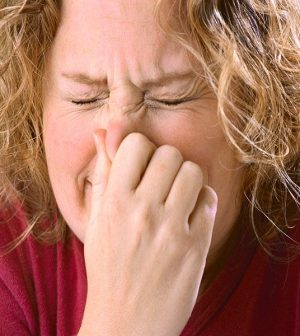- Recognizing the Signs of Hypothyroidism
- 10 Strategies to Overcome Insomnia
- Could Artificial Sweeteners Be Aging the Brain Faster?
- Techniques for Soothing Your Nervous System
- Does the Water in Your House Smell Funny? Here’s Why
- Can a Daily Dose of Apple Cider Vinegar Actually Aid Weight Loss?
- 6 Health Beverages That Can Actually Spike Your Blood Sugar
- Treatment Options for Social Anxiety Disorder
- Understanding the Connection Between Anxiety and Depression
- How Daily Prunes Can Influence Cholesterol and Inflammation
Spring Allergies Are Near, Here’s What Works to Fight Them

For millions of Americans, sneezing, coughing, runny noses, itchy eyes and congestion are sure signs that spring is on the way.
The American College of Allergy, Asthma and Immunology (ACAAI) has advice for coping with these classic hay fever symptoms. It recently published a guideline for health care providers caring for patients with these dreaded seasonal allergies.
“The guideline highlights the fact that cough is a common symptom of hay fever,” said academy president Dr. Luz Fonacier. “Many people aren’t aware of that, and especially as we face another spring with COVID-19, people should be aware that a cough isn’t necessarily a COVID-19 symptom — it can just be part of allergies.”
The guideline recommends avoiding first-generation antihistamines, such as diphenhydramine (Benadryl) and chlorpheniramine (Chlor-Trimeton). They can cause drowsiness and symptoms like dry mouth, dry eyes and constipation.
Instead, the college recommends non-sedating medications such as cetirizine (Zyrtec), levocetirizine (Xyzal), fexofenadine (Allegra Allergy), loratadine (Claritin) or desloratadine (Clarinex).
The guidelines say inhaled corticosteroids such as fluticasone (Flovent), mometasone (Asmanex HFA), budesonide (Entocort) and triamcinolone (Nasacort) are the most effective treatment if you have persistent allergy symptoms, especially if they’re affecting your quality of life. They may even help control symptoms that accompany eye allergies, according to the ACAAI.
The oral decongestant pseudoephedrine (Sudafed) can help clear a stuffy nose, but is the main ingredient in methamphetamine (meth), the guidelines point out. As such, pseudoephedrine is only available by prescription or by special request from a pharmacist, depending on the state.
Pseudoephedrine has many side effects, including insomnia, loss of appetite, irritability, and heart palpitations. You should not use it if you’re pregnant, ACAAI cautioned.
A lack of adequate studies means that the college couldn’t make recommendations about alternative therapies such as acupuncture or herbal medications to treat hay fever.
It’s common for people who get tested for hay fever to be tested for food allergies at the same time, but this shouldn’t be done because food allergies don’t cause nasal symptoms, according to the guideline.
Hay fever testing should check for sensitivity to pets, dust mites, trees, grasses, weeds and mold, which are the most likely triggers for nasal allergies.
More information
The American Academy of Family Physicians has more on hay fever.
SOURCE: American College of Allergy, Asthma and Immunology, news release, Feb. 17, 2021
Source: HealthDay
Copyright © 2026 HealthDay. All rights reserved.










